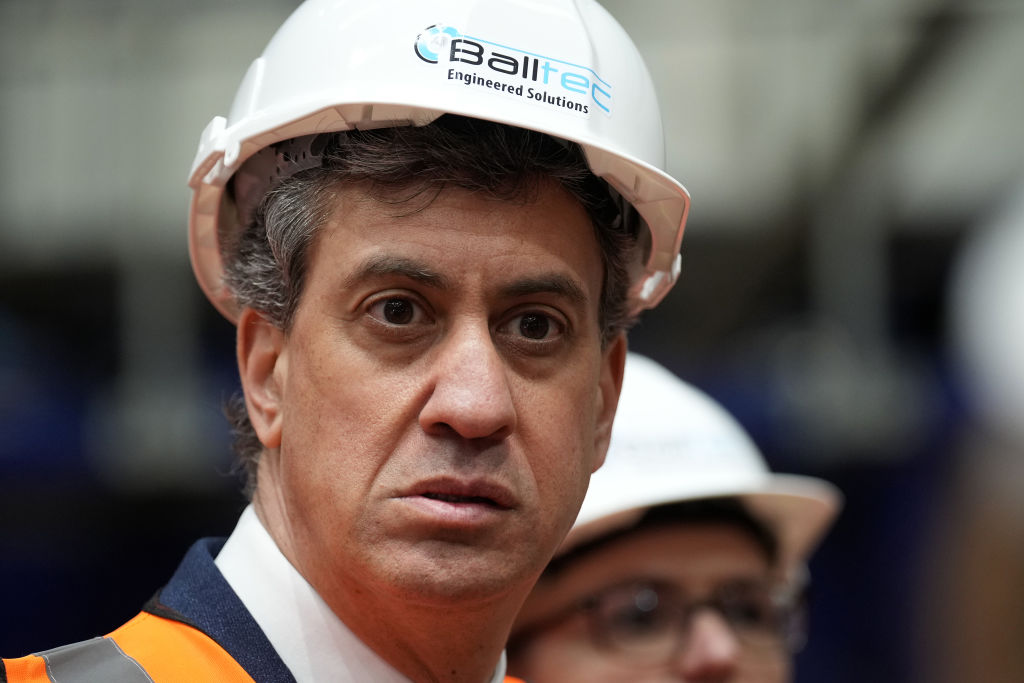Energy Secretary Ed Miliband loves making videos and posting them on X. Having promised during the election to save households £300 a year by creating a Net Zero electricity network by 2030, he did it again on Tuesday, saying he had just been given the “expert verdict on our clean power mission”, confirming that “clean power by 2030 is not only achievable but can lead to cheaper and more secure electricity” while generating “wealth” and thousands of new jobs.
Under close analysis, these bold claims are starting to fall apart. UnHerd has already pointed out that the expert verdict to which Miliband referred, a report from the National Energy System Operator (NESO), says achieving this goal would require investment in “clean” energy of well over £40 billion each year — around four times the sum invested in the period 2020-24, a total of between £260 and £296 billion.
Miliband has persuaded Chancellor Rachel Reeves to increase his department’s budget from £6.4 billion in 2023-4 to £14.1 billion in 2025-26, but a further rise of more than £26 billion is clearly out of the question. NESO’s answer is that, somehow, these vast sums can be acquired from the private sector.
However, there is mounting evidence that more than £40 billion a year is an underestimate. The sums set out in NESO’s report assume that the cost of building offshore wind farms, which must be rapidly and massively stepped up, is about to plummet by 50%, to a bargain £1.5 million per megawatt of generating capacity.
Yet documents revealed by the campaign group Net Zero Watch suggest this is not going to happen. The developers of Moray West, one of the biggest projects being constructed off the coast of Scotland, have already spent £1.4 billion just on its foundations, the equivalent of £1.6 million per megawatt.
Further flaws have been identified by the energy expert David Turver. According to NESO, residential demand can be cut by a fifth, helped by what is known as “demand flexibility”. This would mean energy rationing, probably using powers granted under the 2023 Energy Act that allow Miliband’s officials to turn off “smart” appliances such as fridges, washing machines and heating.
NESO says that Miliband’s “clean energy superpower” will also have to rely on ancient nuclear power stations whose operational life has already been extended several times, as well as the hope that the new Hinkley Point C reactor, which has been hit by numerous delays and technical problems, will be up and running. Its owner, EDF, originally promised it would be finished by 2017, and earlier this year said it would be supplying power to the grid by 2031, not 2030.
As for NESO presenting a supposedly independent verdict, it should be borne in mind that NESO is not independent of Miliband at all. Spun out of the National Grid after Labour’s election win, it is a limited company with one “active person with significant control”: Ed Miliband, who has the power to hire and fire its senior staff.
Claire Coutinho, Miliband’s predecessor as energy secretary, highlighted further concerns in a thread on X this week. To connect new renewable energy plants to the grid will require twice as many pylons, cabling and underground power lines to be built on time in the next five years as has been managed in the last 10. If this fails, consumers will have to fork out billions in “constraint payments” to operators whose power is not even being used.
NESO and Miliband, Coutinho pointed out, claim that bills would be protected from surges in fossil fuel prices. Yet the Government’s Office for Budget Responsibility recently predicted that the price of gas is set to fall, further undermining his assertion that the vast investment needed to make his dream real will eventually save consumers money.
Finally, there is the weather. This week, Britain and all of Europe have been living in what the Germans call a Dunkelflaute, a period when little or no energy can be generated by wind or solar because the air is still and the sky cloudy. For example, at 7pm on 5 November, renewables supplied less than 5% of the UK’s electricity demand. The lights are on only because we still have gas-fired power stations, most of which will be closed by 2030 under Miliband’s plans. NESO says battery capacity needs to be increased by more than 800% to fill the gap caused by such events, but the charge in grid-scale batteries lasts at most a few hours.
Another idea for energy storage is to use hydrogen, made by using excess power generated in periods of plenty to electrolyse water into its constituent elements, hydrogen and oxygen. But although the Government has said it will spend £500 million on developing this technology, there is no possibility of it being ready on a large scale for many years.
The prospect, according to Coutinho, is that when we head into the 2029 election, “Ed will be asking the equivalent of 10 million homes to use energy not when they need it, but when the wind decides to blow. I don’t think anyone in this country would define that as energy security.”











Join the discussion
Join like minded readers that support our journalism by becoming a paid subscriber
To join the discussion in the comments, become a paid subscriber.
Join like minded readers that support our journalism, read unlimited articles and enjoy other subscriber-only benefits.
Subscribe